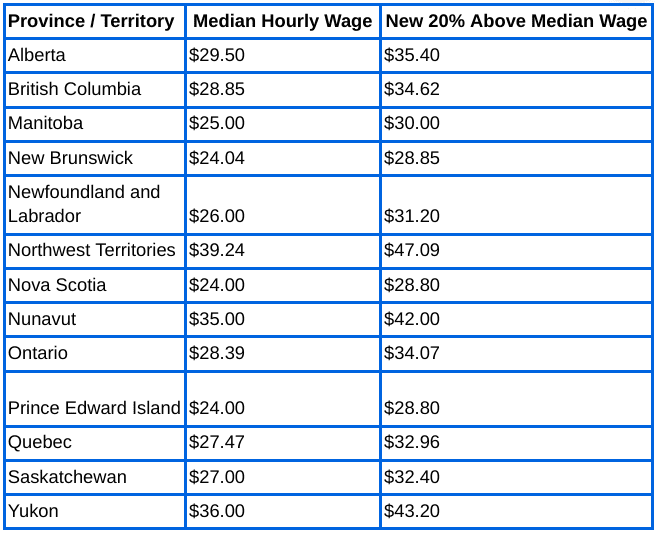Temporary Foreign Workers: Update on Median Hourly Wage Requirements

Temporary Foreign Workers: Update on Median Hourly Wage Requirements
As part of ongoing efforts to safeguard Canada’s labour market and promote fair compensation for workers, Employment and Social Development Canada (ESDC) has announced a new wage threshold under the Labour Market Impact Assessment (LMIA) program, effective November 8, 2024. This change raises the wage requirement for high-wage LMIA applications to help protect Canadian job seekers while ensuring fair compensation for foreign workers.
New Wage Threshold for High-Wage LMIA Stream
On October 22, Canada’s Minister of Employment, Workforce Development, and Official Languages, Randy Boissonnault, confirmed that, as of November 8, 2024, employers must offer at least 20% above the median hourly wage of their province to qualify for high-wage LMIA-supported positions. For example, in Ontario, where the median wage is $28.39 per hour, employers will now need to offer a minimum of $34.07 per hour under the high-wage stream. This adjustment aims to maintain fair compensation for TFWs while prioritizing Canadian workers. Additionally, recent measures restrict low-wage TFWP access, reflecting the government’s broader goal to balance temporary residency’s impact on housing and living costs in Canada.
Updated Median Hourly Wages by Province and Territory (20% Above the Median)

Employers applying for TFWs under the high-wage stream must now offer 20% above each province’s median wage.
Table with the Updated Median Hourly Wages by Province and Territory (20% Above the Median)
Additional Information for Low-Wage Positions
Employers applying for a Labour Market Impact Assessment (LMIA) for a low-wage position must adhere to specific wage standards to ensure fair compensation for temporary foreign workers (TFWs). The minimum wage for low-wage LMIA applications must be the highest of the following:
- The median wage on Job Bank for the occupation and work location.
- The wage paid to current employees with similar skills and years of experience in the same role and work location.
Starting November 8, 2024, the wage threshold for determining the low-wage stream will increase by 20%. Employers offering a wage below the prevailing rate will receive a negative LMIA, indicating they do not meet the labour market factor for wage assessment.
To determine the median wage on Job Bank:
- Go to “Compare wages” on Job Bank.
- Enter the job title or National Occupational Classification (NOC) code in the “Job search” field.
- The hourly median wage will be listed in the middle column.
Employers and TFW applicants should consider these updates to ensure compliance with the revised LMIA wage standards. This adjustment reflects Canada’s ongoing commitment to balancing labour market needs with fair wages, benefiting both local and foreign workers.
Implications for Current Temporary Foreign Workers (TFWs)
Approximately 34,000 TFWs currently working in Canada with LMIA-based permits will not be impacted by this new wage requirement until their permits expire. Renewals after November 8, 2024, however, must adhere to the updated wage standards, reinforcing Canada’s commitment to fair compensation and incentivizing Canadian hiring.
Overview of Labour Market Impact Assessment (LMIA)
A Labour Market Impact Assessment (LMIA) is an ESDC-issued document ensuring that no qualified Canadian worker is available to fill a given job and that hiring a foreign worker will not adversely impact the Canadian labour market. Currently, employers hiring under the high-wage stream must offer wages at or above the provincial median rate. However, as of November 8, 2024, high-wage LMIA applicants will need to meet the new standard of offering wages at least 20% above the provincial median to qualify.
These heightened wage standards will also apply to LMIA renewals, further reinforcing the importance of fair monetary compensation to all parties in the labour market. This change underscores Canada’s commitment to balancing a healthy labour market with fair wages and prioritizing Canadian workers.
It’s important to note that these new requirements will not apply to LMIA-exempt permits under the International Mobility Program (IMP) or to existing, approved LMIAs.
Reasons Behind the Wage Threshold Increase
The increase aligns with Canada’s strategy to manage the rapid growth in TFW numbers, which has surged 88% since 2019. In 2023 alone, Canada issued 183,820 temporary work permits (TWPs). New policies now restrict low-wage TFW hiring in areas with low employment rates and impose workforce caps to ease local community impacts and mitigate housing pressures.
Demand Growth in TFW Program
From 2016 to 2023, Canada has seen a substantial rise in LMIA-approved TFW positions, driven by labour shortages across sectors such as healthcare and food services:
- 2016: 90,314 approvals
- 2017: 98,146 approvals
- 2018: 108,988 approvals
- 2019: 130,457 approvals
- 2020: 125,279 approvals
- 2021: 133,196 approvals
- 2022: 222,847 approvals
- 2023: 239,646 approvals
This represents a 120% increase from 2018 to 2023, reflecting TFWs’ growing role in supporting Canada’s economy.
Data Considerations
The above data covers only TFWs on closed work permits requiring LMIA approval; the total number of foreign nationals working in Canada is higher due to open work permits. Additionally, while TFW approvals have risen, this does not guarantee employment, as some employers ultimately decide not to hire TFWs, choosing local hires or not filling positions. The figures underscore an increasing trend among employers to consider TFWs for vacant roles.
Top Occupations with Highest TFW Approval Increases (2018–2023)
The following occupations have experienced the largest spikes in TFW approvals, reflecting specific areas of labour shortage:
- Nurse aides, orderlies, and patient service associates: 15,613% increase
- Food counter attendants, kitchen helpers, and support roles: 4,802% increase
- Construction trades helpers and labourers: 3,955% increase
- Light duty cleaners: 1,414% increase
- Administrative assistants: 1,063% increase
- Retail sales supervisors: 426% increase
- Transport truck drivers: 361% increase
- Food service supervisors: 341% increase
- Cooks: 279% increase
- Fish and seafood plant workers: 191% increase
These numbers reveal significant demand in healthcare, food services, and construction, indicating persistent recruitment challenges in these fields.
Important Considerations for Employers and TFW Applicants
Employers should carefully consider these new wage standards when planning to hire TFWs under the high-wage LMIA stream. For prospective TFWs, understanding Canada’s evolving labour policies and wage criteria is essential to meet eligibility and application standards.
Latest Articles
Subscribe Newsletter
Get instant access to breaking news, the hottest reviews, great deals and helpful tips.








